
|
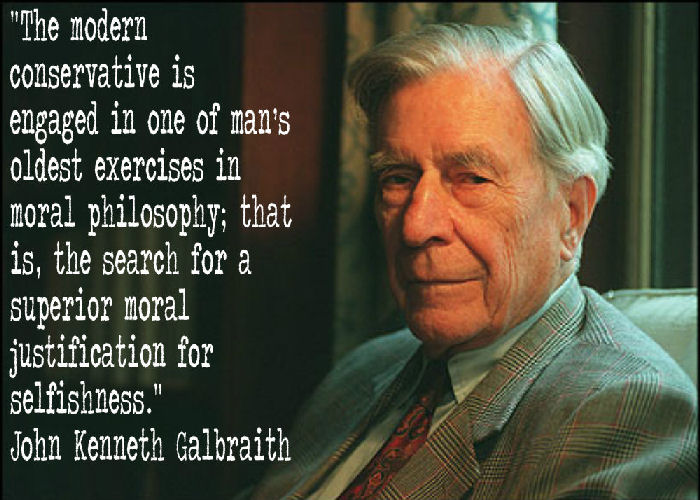
conservative
"Conservative, n. A statesman who is enamored of
existing evils, as distinguished from the Liberal, who wishes to replace them
with others." - Ambrose Bierce, Devil's Dictionary
"The Americans of 1776 were among the first men to
defend an open society and constitutional liberty. The most remarkable
characteristic of this political theory sits in its deep-seated conservatism.
However radical the principles of the Revolution may have seemed to the rest of
the world, in the minds of the colonists they were thoroughly preservative and
respectful of the past." - Clinton Rossiter980 AD Latin, conservare "to keep,
preserve."
1380 Old French - "conserver."
Archaically a conservative
was a preservative agent or principle.
A conservative would be
concerned with preserving his or her social culture and traditional way of
living by protecting it from ruin, injury, innovation, or radical change by
avoiding excess.
A conservative
wants to preserve the land
for future generations.
Conservatives frown on
behavior outside of accepted and practiced norms.
Over time the
word symbol conservative took on added connotations.
1790 As a modern political
tradition, conservatism traces to opposition to the
French Revolution
found in Reflections on the Revolution in France by Edmund Burke, but
the word conservative is not found in his writing.
The word
conservative was coined by the French disciples of Edmund Burke, (e.g.
Chateaubriand, who titled his journal defending clerical and political
restoration "Le Conservateur").
Burke suggested that a genuinely prudent
conduct of affairs would proceed without assaulting the mental associations of
the governed, and, as change was omnipresent, would conduct its share under
accepted names by gradual and by moderate reform
of institutions and practices rather than by
immediate and total
replacement, which Burke stigmatised as
'innovation'.
"A spirit of innovation is generally the result of a
selfish temper and confined views." - Edmund Burke, Reflections on the
Revolution in France
In truth Edmund prefers
social custom over
social experimentation.
1830 Conservative as the name of a British
political faction first appeared in an issue of the "Quarterly Review," in an
unsigned article sometimes attributed to John Wilson Croker.
1843
Conservative replaces Tory, reflecting both a change from the pejorative
name (in use for 150 years) and repudiation of some reactionary policies.
Extended to similar spirits in other parties from 1845.
"Strictly
speaking, conservatism is not a political system, but rather a way of looking
at the civil order." - Russell Kirk
The neo-conservatives are
radicals not conservatives.
Conservatives are interested
in preservation of existing resources.
The
neo-conservatives (neo-liberals to much the rest of
the world) were only interested in exploiting resources for short term gain.
The neo-conservatives must
have known that embarking upon the path of
global hegemony was a dangerous and
radical course of action which
could result in injury or ruin to
the American political system.
The neo-conservatives were
intent on bringing about radical change by
fostering excess' in the financial
sectors through radical
deregulation.

liberal
1908
David Lloyd George replaces HH
Asquith as Chancellor of the Exchequer.
1909 To fund
extensive welfare reforms David Lloyd George proposed taxes on land
ownership and high incomes in the "People's Budget", which the
Conservative dominated House of Lords rejects.
1910 A constitutional crisis is only resolved after two
elections and the passage of the Parliament Act 1911.
1911 National Insurance Act establishes the
modern welfare state.
1912 The Marconi scandal involves Liberal officials under the
Prime Minister HH Asquith profiting
through insider trading about intentions with respect to Marconi Company
and Imperial Wireless Chain.
The Imperial Wireless Chain
is a strategic international communications network of powerful long range
radiotelegraphy stations, created by the British government to link the
countries of the British Empire.
1915 HH Asquith
forms a wartime coalition between
left and right.
David Lloyd George as Minister of Munitions
rapidly expands
production.
1916 David Lloyd George
appointed Secretary of State for War.
December 1916 David Lloyd
George forms a coalition government in the UK and is appointed Prime Minister
by King George V.
David Lloyd George relied on the support of
Conservatives and of the press baron Lord Northcliffe (who owned both The
Times and the Daily Mail).
Besides the Prime Minister, the
five-member War Cabinet contains three Conservatives - Lord President of the
Council and Leader of the House of Lords, Lord Curzon; Chancellor of the
Exchequer and Leader of the House of Commons, Bonar Law; and Minister
without Portfolio, Lord Alfred
Milner - and Arthur Henderson, unofficially representing Labor.
In
the first 235 days of its existence, the War Cabinet meets 200 times.
March 20, 1917 to May 2,
1917
Imperial War Cabinet, with representatives from
Canada, Newfoundland, Australia,
New Zealand,
South Africa and India, meets 14
times.
David Lloyd George plays a critical role in the Balfour
Declaration.
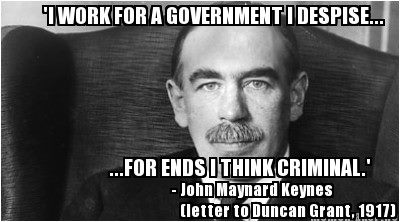
In
"General Theory of Employment, Interest and Money" John Maynard Keynes
begins by observing that before we can construct relevant theories for the
present, we have to unlearn the useless theories of the past.
Shedding old theories is more
difficult than building new ones.
John Maynard Keynes concluded
with the observation
"practical men" who chart national policies are more often than not the slaves
of useless theories.
The
political elite responsible
for the current global disaster are
disaster capital
purveyors of antiCulture
who intend to replace the
gods of the past with the gods of
the future within the next two decades.
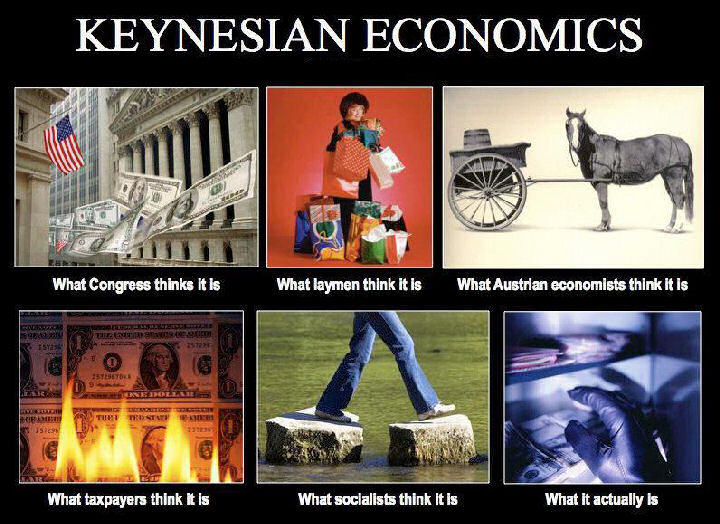

Language
evolves over time.
The word symbol
liberal was originally
defined as of, pertaining to, or befitting a freeman, free by birth.
Liberal acts became those actions appropriate for an adult person of
free birth - a lady or a gentleman - an action inappropriate for a
serf,
slave,
peasant,
landless craftsmen (tailors,
cobblers,
carpenters,
blacksmiths).
Over time a connotation developed with use of the word
liberal.
An individual branded liberal was
liberated from moral
constraint, acted
licentious, lacked moral
restraint or exercised the
freedom to live
excessively.
When liberal was first used it
was defined as a representational form of government,
a republican form of government,
as opposed to a monarchy.
In a monarchical
system laws are designed to appease
the landed aristocracy
whereas in a representative
form of government laws are designed by
the people with the peoples overall welfare in mind.
Today those who
define themselves as liberal:
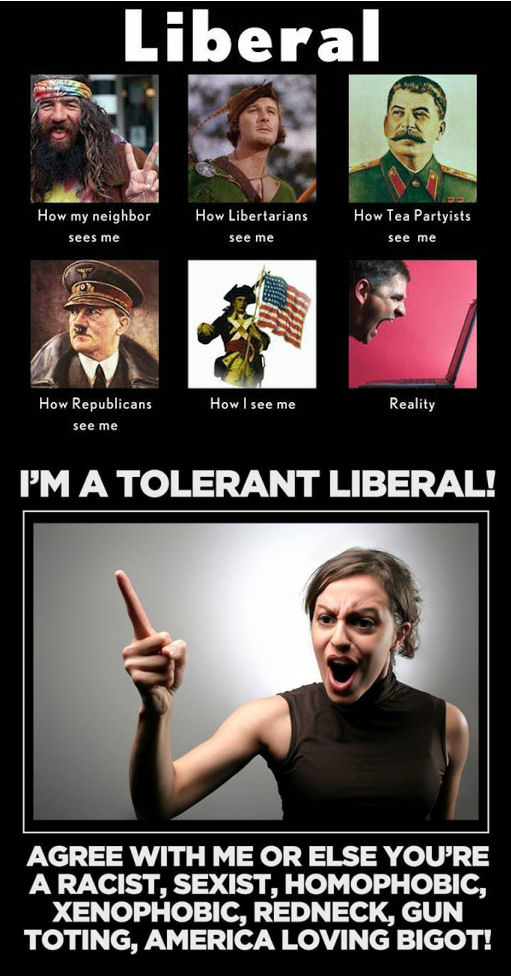
A liberal individual may show a willingness
to make "liberal" donations.
A
liberal interpretation of a rule or law is not strict or rigorous while a
liberal interpretation of the
Bible is an interpretation that is not literal.
A liberal education is
defined as an education based on the traditional arts and sciences that
disciplines and conditions the mind
through recognition.
Today a liberal education
connotes liberation from moral constraint.
Opponents of liberalism have attempted to
revive this obsolete definition as
morally unrestrained or
licentious opponents of the
established moral order.
Usage: Liberal, Generous.
Liberal
is freeborn, and generous
is highborn.
The former is opposed to
the ordinary feelings of a
servile state, and implies largeness of spirit in the vein of
giving, judging, acting as the Hero.
A
nobleness of soul, in the past
appropriate to those of high rank, -
a spirit that goes out of
self, and finds
enjoyment in consulting constituents.
Generosity is measured by the
extent of the sacrifices it
makes.
"c. 1375; from old French, liberal
"befitting free men, noble,
generous;" from
Latin, liberalis "noble,
generous;" literally, "pertaining to a free man;" from liber "free;" from
Proto-Indo-European base *leudheros; (Greek, eleutheros "free"), probably
originally "belonging to
the people"
(though the precise semantic development is obscure), from *leudho- "people"
(evolutions: Old Church Slavonic, ljudu; Lithuanian, liaudis; Old English,
leod; German, Leute "nation, people").
Earliest reference in English is
to the liberal arts (Latin, artes liberales), directed to a broader
understanding, not immediate practical purpose.
Sense of "free in
bestowing" is from 1387.
With a meaning "free from restraint in speech or
action" (1490) liberal was used in the 16th century through the 17 century
as a term of reproach.
"Free from prejudice,
tolerant," emerged in 1776-88.
"Purely in reference to political
opinion, "tending in favor of freedom and democracy" it dates from 1801, from
the French libéral, originally applied in English by its opponents
(often in French form and with suggestions of foreign lawlessness) to the party
favorable to individual political freedoms.
But also (especially in
American politics) tending to mean "favorable to government action to effect
social change," which seems at times to draw more from the religious sense of
"free from prejudicial favor of traditional opinions and
established institutions" (and
thus open to new ideas and plans of reform), which dates from 1823." - Douglas
Harper
2016
I'm a liberal professor, and my liberal students terrify
me |
|
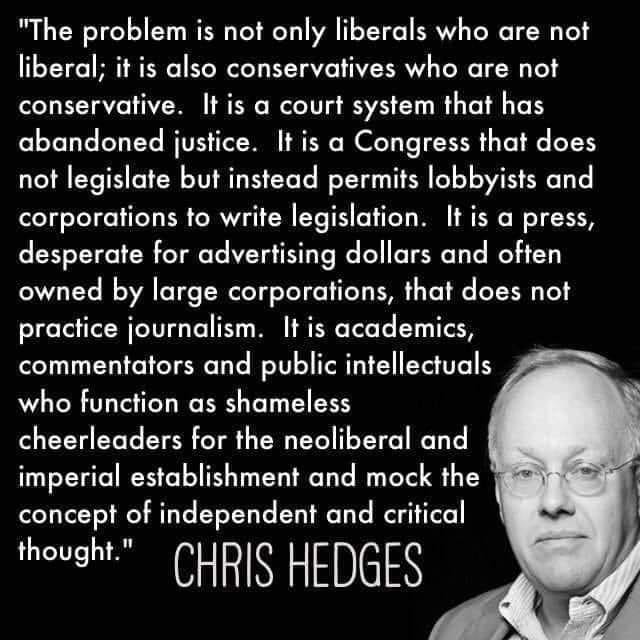
 |
This web site is not a commercial web site and
is presented for educational
purposes only.

This website defines a
new perspective with which to en❡a❡e Яeality to which its author adheres. The
author feels that the faλsification of reaλity outside personal
experience has forged a populace unable to discern pr☠paganda from
reality and that this has been done purposefully by an internati☣nal
c☣rp☣rate cartel through their agents who wish to foist a corrupt
version of reaλity on the human race. Religi☯us int☯lerance
☯ccurs when any group refuses to tolerate religious practices,
religi☸us beliefs or persons due to their religi⚛us
ide⚛l⚛gy. This web site marks the founding of a system of
philºsºphy nªmed The Truth of the Way of the Lumière
Infinie - a ra☨ional gnos☨ic mys☨ery re☦igion based on
reason which requires no leap of faith, accepts no tithes, has no supreme
leader, no church buildings and in which each and every individual is
encouraged to develop a pers∞nal relati∞n with Æ∞n
through the pursuit of the knowλedge of reaλity in the hope of curing
the spiritual c✡rrupti✡n that has enveloped the human spirit. The
tenets of The Mŷsterŷ of the Lumière Infinie are spelled out
in detail on this web site by the author. Vi☬lent acts against
individuals due to their religi☸us beliefs in America is considered a
"hate ˘rime."
This web site in no way c☬nd☬nes
vi☬lence. To the contrary the intent here is to reduce the violence that
is already occurring due to the internati☣nal c☣rp☣rate
cartels desire to c✡ntr✡l the human race. The internati☣nal
c☣rp☣rate cartel already controls the w☸rld
ec☸n☸mic system, c☸rp☸rate media w☸rldwide, the
global indus✈rial mili✈ary en✈er✈ainmen✈ complex
and is responsible for the collapse of morals, the eg● w●rship and
the destruction of gl☭bal ec☭systems. Civilization is based on
coöperation. Coöperation with bi☣hazards at the
point of a gun.
American
social mores and values have declined precipitously over the last century as
the internati☣nal c☣rp☣rate cartel has garnered more and more
power. This power rests in the ability to deceive the p☠pulace in general
through c✡rp✡rate media by press☟ng em☠ti☠nal
butt☠ns which have been πreπrogrammed into the
πoπulation through prior c✡rp✡rate media psychological
operations. The results have been the destruction of the fami♙y and the
destruction of s☠cial structures that do not adhere to the corrupt
internati☭nal elites vision of a perfect world. Through distra˘tion and
coercion the dir⇼ction of th✡ught of the bulk of the
p☠pulati☠n has been direc⇶ed ⇶oward s↺luti↻ns proposed by the
corrupt internati☭nal elite that further con$olidate$ their p☣wer
and which further their purposes.
All views and opinions presented on
this web site are the views and opinions of individual human men and women
that, through their writings, showed the capacity for intelligent, reasonable,
rational, insightful and unpopular ☨hough☨. All factual information presented
on this web site is believed to be true and accurate and is presented as
originally presented in print media which may or may not have originally
presented the facts truthfully.
Øpinion and ☨hough☨s
have been adapted, edited, corrected, redacted, combined, added to, re-edited
and re-corrected as nearly all opinion and ☨hough☨ has been throughout time but
has been done so in the spirit of the original writer with the intent of making
his or her ☨hough☨s and opinions clearer and relevant to the reader in the
present time.
Fair Use Notice

This site may contain
copyrighted material the use of which has not always been specifically
authorized by the copyright owner. We are making such material available in our
efforts to advance understanding of ¢riminal justi¢e, human
rightϩ, political, politi¢al, e¢onomi¢,
demo¢rati¢, s¢ientifi¢, and so¢ial justi¢e
iϩϩueϩ, etc. We believe this constitutes a 'fair use' of any
such copyrighted material as provided for in section 107 of the US Copyright
Law. In accordance with Title 17 U.S.C. Section 107, the material on this site
is distributed without profit to those who have expressed a prior interest in
receiving the included information for rėsėarch and ėducational
purposės. For more information see:
www.law.cornell.edu/uscode/17/107.shtml. If you wish to use copyrighted
material from this site for purposes of your own that go beyond 'fair use', you
must obtain permission from the copyright owner. |
 Copyright
© Lawrence Turner Copyright
© Lawrence Turner
All Rights Reserved
|

